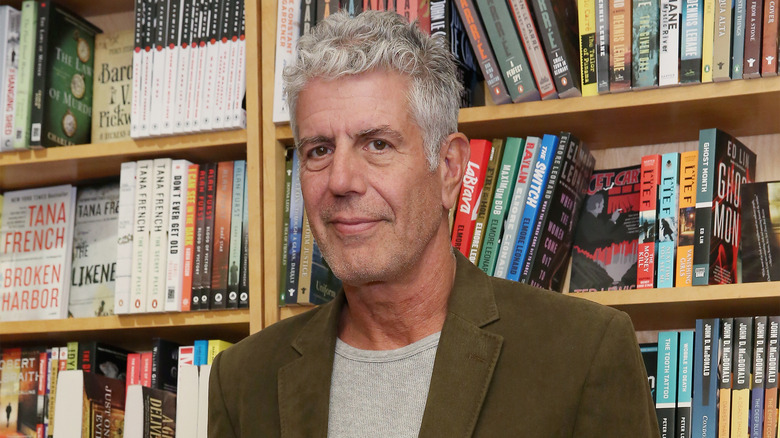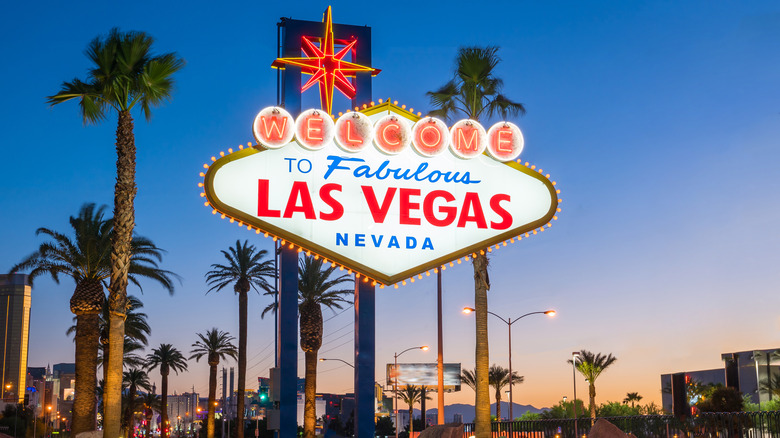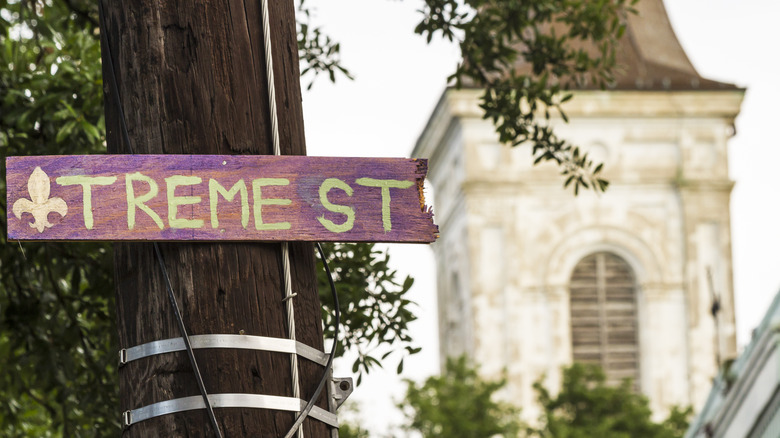The Unique Resource Anthony Bourdain Recommended Travelers Use Instead Of Guidebooks
Though he was an avid reader, you wouldn't necessarily find Anthony Bourdain perusing a guidebook on the way to his next travel destination. In fact, the late chef and travel host recommended preparing for trips with a different kind of writing altogether: novels. This should come as no surprise to anyone familiar with Bourdain's biography. He started out writing crime novels before he found success as a nonfiction author and TV personality. Later, he even dabbled in screenwriting, penning several episodes of the HBO series, "Treme," set in New Orleans. Yet it was Bourdain's New York Times bestselling memoir, "Kitchen Confidential: Adventures in the Culinary Underbelly," that first catapulted him to fame as a writer.
If you get lucky, you might find a copy of "Kitchen Confidential" in your airport bookstore. The traditional image of an airplane book, however, would be a plot-driven page-turner suitable for light reading while in transit. Bourdain had a different type of novel in mind when he spoke to ShermansTravel in a 2013 interview. Rather than simply entertain yourself or read boilerplate info about sightseeing spots, his advice was to seek out a local perspective in literary form.
"Read up; but not the guide books," Bourdain said. "Read novels by people who spent a long period of time at the street level there: Ex-intelligence officers, NGO workers. It doesn't matter how old the book is, it'll give you a sense of how a place smells, feels, the little intricacies, annoyances, and delights of a place."
Books and authors Bourdain recommended
In "Kitchen Confidential," Bourdain almost made himself sound like an author with an intelligence officer background, just like the type he advocated. The chapter, "Inside the CIA," detailed his time at the Culinary Institute of America, which he referred to with the same acronym as the Central Intelligence Agency. One real intelligence operative Bourdain recommended as an author, though, was novelist-turned-MI6-agent Graham Greene. When Bourdain named his favorite books to Business Insider, he listed Greene's "The Quiet American" among them, saying, "I re-read it frequently. Particularly when visiting Vietnam."
Bourdain also cited Julia Child as an early influence on his cooking in "Kitchen Confidential." In the "First Course" section, he wrote, "Julia Child's recipes have little snob appeal, but they also tend to work." Like Bourdain, Child was a chef, TV host, and bestselling author. Before she went abroad and penned "My Life in France" (which could be a good airplane book for your next trip to Paris), she worked as an intelligence officer for the OSS.
As for authors with NGO backgrounds, Bourdain's own book imprint published "We Fed An Island" by chef José Andrés. The book chronicled the nonprofit effort led by Andrés and World Central Kitchen in Puerto Rico after Hurricane Maria. If you'd rather take a road trip in the U.S. than visit one of its island territories, Bourdain called "Fear and Loathing in Las Vegas" by Hunter S. Thompson "the book that probably influenced me more than any other."
Windows into local history (and travel impressions)
The above books are just a few examples of ones written by people who spent time on the ground in potential travel destinations, working them into their writing without authoring actual guidebooks. If Hunter S. Thompson novels aren't your thing — and you're not traveling to Las Vegas or any of those other places — you can always research works of literature tied to your specific destination. If nothing else, soaking up literary impressions could add a deeper dimension to your travels and give you a greater appreciation for local history in certain places. Say you need a Bourdain-appropriate hotel that's "down in the Treme" (or near it, anyway). If you know your local history, you could stay at the one that's a literary landmark with a unique rotating bar in New Orleans.
Though Bourdain recommended streetwise "novels by people who spent a long time" in a destination, his own writing remains a testament to the power of first impressions in travel as well. Looking back on "Kitchen Confidential" 20 years later, The Ringer called its "Mission to Tokyo" chapter "the functional first episode" of Bourdain's later travel programs. Tokyo was one of Bourdain's favorite places to visit, and he did so numerous times on TV. Yet his evocative descriptions of his first time in the city in "Kitchen Confidential" also brought it to life with vivid sensory details. Who needs a guidebook when you've got an artful literary travelogue like that to inspire you?


